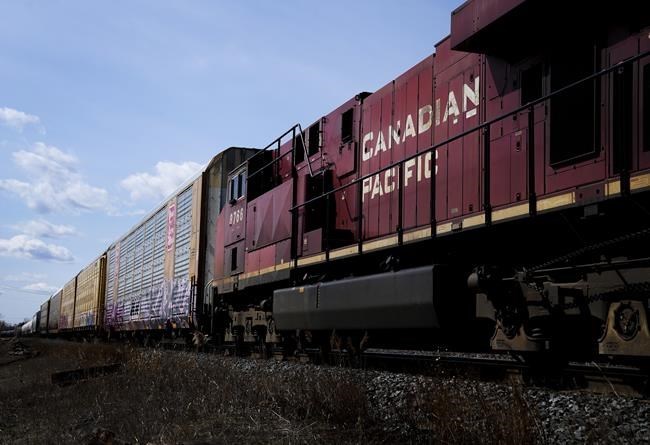MONTREAL — The head of Canada's second-biggest railway enjoyed a big jump in compensation after a historic year for the company as it integrated a major acquisition.
Keith Creel, CEO of Canadian Pacific Kansas City Ltd., took in total compensation of $20.1 million last year — a boost of 38 per cent from $14.5 million in 2022 — company financial filings show.
CPKC's five top officers, including Creel, earned $63.5 million overall in 2023 compared with less than half that amount the previous year.
The C-suite pay bump stemmed largely from share-based awards and cash bonuses after Calgary-based Canadian Pacific merged its operations last April with Kansas City Southern.
North America's two smallest Class 1 railways joined forces after CP acquired KCS for US$31 billion in December 2021. The move marked the continent’s first big rail merger in more than two decades, making the conjoined railway the only one to stretch from Canada through the United States to Mexico.
In May, a board committee opted to dole out a one-time "synergy" award in the form of performance shares, a type of stock compensation given in this case to 28 "key senior leaders" excluding the CEO if the company met certain performance criteria — around free cash flow and shareholder returns, for example.
The one-time equity allocation accounted for most of the rise in share-based awards, which amounted to nearly $36 million for the firm's five highest-ranking executives. The awards, in turn, accounted for the vast majority of their overall compensation increase.
A jump of more than 460 per cent to $9 million in annual bonuses — including a more than 500 per cent leap to $3.8 million in cash for the CEO — made up much of the rest.
"The team’s commitment to delivering growth at a low incremental cost while ensuring the safety of its employees and neighbouring communities resulted in a short-term incentive plan corporate performance factor of 140 per cent (of base salary) for our CEO and other named executive officers," CPKC's filing states.
Asked about compensation, the company pointed back to the document.
The synergy awards aimed to keep senior managers "aligned and focused on delivering what we said we would do," board member Matthew Paull, who chaired the compensation committee, wrote in the paper prepared for the railway operator's shareholders.
"2023 was a transformative year for CPKC with the completion of the KCS acquisition and the delivery of (adjusted earnings) synergies is a key component of the merger value proposition supported by shareholders and regulators," states the proxy circular, submitted to financial regulators Thursday.
CPKC reported in January that net income rose 12 per cent to $3.93 billion last year from combined Canadian Pacific and Kansas City Southern profits of $3.52 billion in 2022, all amid an economic slowdown and a complex corporate integration.
At rival Canadian National Railway Co., compensation moved in the other direction. Its six senior executives saw their total compensation drop three per cent to $29.6 million, largely due to lower bonuses after the Montreal-based company fell short of performance targets.
Chief executive Tracy Robinson's compensation nudged up by two per cent to $14.0 million, according to the company's proxy circular on Thursday.
CN said compensation for senior executives fell “mainly since the overall bonus payout in 2023 (69 per cent) was lower than the overall bonus payout in 2022 (137 per cent).”
“The bonus payout for 2023 was impacted by weaker than expected economic conditions, a record Canadian wildfire season, floods and a labour disruption at CN-served ports,” said spokeswoman Ashley Michnowski in an email.
The disappointing compensation — relatively speaking — came despite a 10 per cent profit boost to $5.63 billion for CN during Robinson's first full year in the top spot.
This report by The Canadian Press was first published March 25, 2024.
Companies in this story: (TSX:CP; TSX:CNR)
Christopher Reynolds, The Canadian Press



